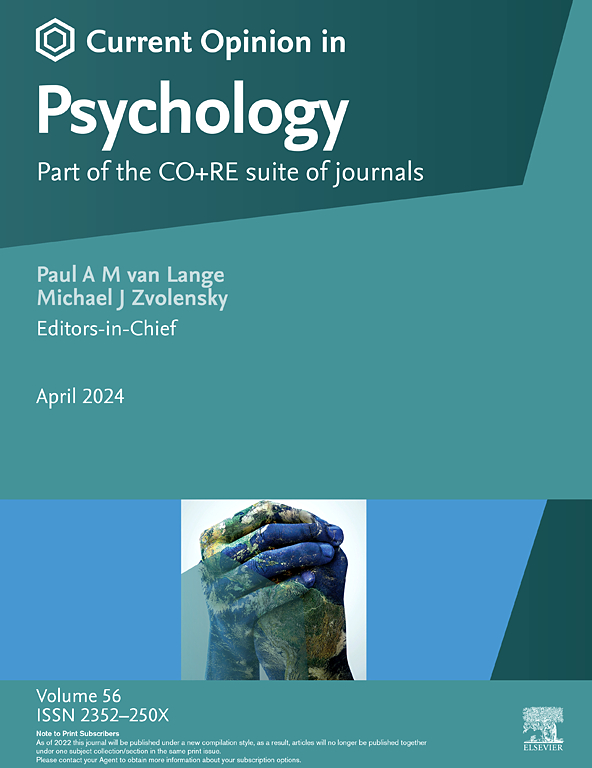A cognitive approach to learning, monitoring, and shifting social norms
IF 6.3
2区 心理学
Q1 PSYCHOLOGY, MULTIDISCIPLINARY
引用次数: 0
Abstract
Social norms govern and prescribe how group members behave. Since norms manifest in individuals' behavior, it is important to consider the cognitive demands associated with detecting and monitoring norm behaviors. Here I describe three types of norms that differ in the behavior they prescribe, the cognitive processes of behavior detection and monitoring they require, and the compliance and cooperative patterns they entail. Categorical norms, such as taboos, prescribe what actions group members must or shouldn't do, and may rely on affective outcomes. Scale-sensitive norms govern how much of a behavior one must do and rely on signal detection processes. History-sensitive norms consider a whole sequence of actions performed by specific individuals, such as the history of contribution, and require evidence accumulation mechanisms. Detecting and monitoring these different types of behaviors poses different cognitive demands, which may affect the extent and stability of social norms. By taking the cognitive perspective, it may be possible to understand why some norms are more resilient than others, and plan interventions that promote norm change by matching these cognitive demands.
学习、监督和转变社会规范的认知方法
社会规范管理并规定群体成员的行为方式。由于规范体现在个人的行为中,因此考虑与检测和监控规范行为相关的认知要求非常重要。在此,我将介绍三种类型的规范,它们在规定的行为、行为检测和监控所需的认知过程以及遵守和合作模式方面各不相同。分类规范(如禁忌)规定群体成员必须或不应该采取哪些行动,并可能依赖于情感结果。规模敏感性规范规定一个人必须做多少行为,并依赖于信号检测过程。历史敏感型规范考虑的是特定个人所采取的一系列行动,例如贡献的历史,需要证据积累机制。检测和监控这些不同类型的行为提出了不同的认知要求,这可能会影响社会规范的程度和稳定性。从认知角度出发,我们就有可能理解为什么有些规范比其他规范更有弹性,并规划干预措施,通过匹配这些认知需求来促进规范的改变。
本文章由计算机程序翻译,如有差异,请以英文原文为准。
求助全文
约1分钟内获得全文
求助全文
来源期刊

Current Opinion in Psychology
PSYCHOLOGY, MULTIDISCIPLINARY-
CiteScore
12.10
自引率
3.40%
发文量
293
审稿时长
53 days
期刊介绍:
Current Opinion in Psychology is part of the Current Opinion and Research (CO+RE) suite of journals and is a companion to the primary research, open access journal, Current Research in Ecological and Social Psychology. CO+RE journals leverage the Current Opinion legacy of editorial excellence, high-impact, and global reach to ensure they are a widely-read resource that is integral to scientists' workflows.
Current Opinion in Psychology is divided into themed sections, some of which may be reviewed on an annual basis if appropriate. The amount of space devoted to each section is related to its importance. The topics covered will include:
* Biological psychology
* Clinical psychology
* Cognitive psychology
* Community psychology
* Comparative psychology
* Developmental psychology
* Educational psychology
* Environmental psychology
* Evolutionary psychology
* Health psychology
* Neuropsychology
* Personality psychology
* Social psychology
 求助内容:
求助内容: 应助结果提醒方式:
应助结果提醒方式:


